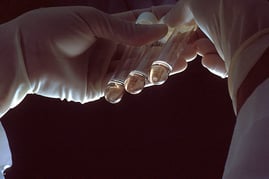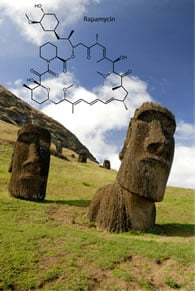 In 1962, John F. Kennedy declared that the United States would go to the moon and in 1969, we did. Now President Obama is calling for the same level of national focus and dedication to win the war against cancer. He announced a new “moonshot” during his last State of the Union Address - a moonshot to cure cancer.
In 1962, John F. Kennedy declared that the United States would go to the moon and in 1969, we did. Now President Obama is calling for the same level of national focus and dedication to win the war against cancer. He announced a new “moonshot” during his last State of the Union Address - a moonshot to cure cancer.
Tags: Aging, Cancer, Biomedical Research Funding, University of Rochester
 As people get older, their bodies become more susceptible to certain diseases. Cancer, among others, is a disease that becomes more common as people age. David S. Yu, M.D., Ph.D from Emory University was recently awarded $1.6 million from the National Institutes of Health (NIH) to study the gene SIRT2 and how it can be manipulated to control the effects of aging and prevent cancer.
As people get older, their bodies become more susceptible to certain diseases. Cancer, among others, is a disease that becomes more common as people age. David S. Yu, M.D., Ph.D from Emory University was recently awarded $1.6 million from the National Institutes of Health (NIH) to study the gene SIRT2 and how it can be manipulated to control the effects of aging and prevent cancer.
Tags: Emory University, Aging, cancer research, Southern, Emory, Atlanta, GA, 2016, BioResearch Product Faire
 Rapamycin has been used as an effective immunosuppresant in organ transplantation for over a decade, but researchers continue to find other potential uses for the drug base, from treating cancer to prolonging aging, including staving off Alzheimer's. The success and promise of this anti-aging research carried out by University of Texas Health Science Center pharmacologist Randy Strong and colleagues has recently led to the announcement of a major biotech spin-off company, Rapamycin Holdings Inc., also based in San Antonio. The new company will pursue development and testing of rapamycin-related drugs based on UTHSC intellectual property, as well as produce enhanced rapamycin for the global research market--something UTHSC currently does. Rapamycin Holdings was formed with aid (and ongoing support) from the Texas Technology Development Center (T3DC), the Texas Research & Technology Foundation (TRTF), as well as other stakeholders, in order to commercialize the research technology and bring new drug treatments to patients.
Rapamycin has been used as an effective immunosuppresant in organ transplantation for over a decade, but researchers continue to find other potential uses for the drug base, from treating cancer to prolonging aging, including staving off Alzheimer's. The success and promise of this anti-aging research carried out by University of Texas Health Science Center pharmacologist Randy Strong and colleagues has recently led to the announcement of a major biotech spin-off company, Rapamycin Holdings Inc., also based in San Antonio. The new company will pursue development and testing of rapamycin-related drugs based on UTHSC intellectual property, as well as produce enhanced rapamycin for the global research market--something UTHSC currently does. Rapamycin Holdings was formed with aid (and ongoing support) from the Texas Technology Development Center (T3DC), the Texas Research & Technology Foundation (TRTF), as well as other stakeholders, in order to commercialize the research technology and bring new drug treatments to patients.
Tags: Aging, University of Texas, Texas, 2012, UT Health Science Center San Antonio, UTxSA, San Antonio, Drug Development
It seems that what you don't know just might hurt you when it comes to your immune system. Dr. Janko Nikolich-Zugich, immunobiologist at the University of Arizona and investigator with the BIO5 Institute, has been studying the effects of cytomegalovirus (CMV) on the human immune system's ability to combat other viruses such as West Nile or the flu as we get older. His research suggests that a person infected with CMV has a diminished immune response compared to an uninfected person. The elderly in particular show a compromised immune response and even turn out to have a lower life expectancy.
Tags: University of Arizona, Aging, Northwest, 2012, Immune System, BioResearch Product Faire Front Line Event, AZ, UAZ, Funding, NH, Tucson
 Oregon State researchers recently discovered DNA in a nematode, a type of roundworm, that may provide an insight into the mechanisms of human aging. The researchers found a specific portion of DNA within the mitochondria of the nematode which displayed the characteristics of "selfish" DNA, in other words, DNA which actually hurts the animal's chances of survival. Scientists have previously found instances of selfish DNA occurring in plants, but this is the first example found in an animal. “We weren’t even looking for this when we found it, and at first we thought it must be a laboratory error,” said Dee Denver, Oregon State associate professor of zoology (photo left courtesy of OSU). "Selfish DNA is not supposed to be found in animals."
Oregon State researchers recently discovered DNA in a nematode, a type of roundworm, that may provide an insight into the mechanisms of human aging. The researchers found a specific portion of DNA within the mitochondria of the nematode which displayed the characteristics of "selfish" DNA, in other words, DNA which actually hurts the animal's chances of survival. Scientists have previously found instances of selfish DNA occurring in plants, but this is the first example found in an animal. “We weren’t even looking for this when we found it, and at first we thought it must be a laboratory error,” said Dee Denver, Oregon State associate professor of zoology (photo left courtesy of OSU). "Selfish DNA is not supposed to be found in animals."
Tags: Oregon State University, Aging, Northwest, cell biology, Oregon, 2012, Cell Research, Genomics, Genetics, current science events, Front Line event, OR, Corvalis, ORSTU, oregon research
Stem cells are remarkable for the promise they hold to regenerate diseased or otherwise compromised organs and tissue in the body. At the University of Texas Health Science Center in San Antonio, researchers at the Barshop Institute of Aging and Longevity Studies are particularly focused on how a patient's own stem cells can be used to treat degeneration caused by aging, such as bone loss. Proprietary cells (i.e. ones from your own body) are the best biological match for therapies to treat you, but the problem is that they're too mature and therefore much less effective than young cells in transforming themselves into new and useful parts. Some people have begun to bank cells from birth, such as those from the umbilical cord, for a child's future need. For the rest of us, there is the very real possibility of coaxing our own older stem cells into a more youthful, robust, and potent state by growing them on a younger scaffold.
Tags: Aging, Stem cell research, Texas, Southwest, UT Health Science Center San Antonio
 The University of Pittsburgh Medical Center (UPMC) recently released a quarterly financial report that showed solid growth for Western Pennsylvania's largest health care provider and one of the largest nonprofit health systems in the US. It also announced that it will be begin construction on a $300M facility to house its nascent Center for Innovative Science, which "will bring together leading scientists willing to develop bold, new approaches to understanding complex diseases," according to UPMC's president. In conjunction with its academic partner, the University of Pittsburgh, UPMC is already recruiting nationally for "a scientific leader in genetics and genomics" to head the center.
The University of Pittsburgh Medical Center (UPMC) recently released a quarterly financial report that showed solid growth for Western Pennsylvania's largest health care provider and one of the largest nonprofit health systems in the US. It also announced that it will be begin construction on a $300M facility to house its nascent Center for Innovative Science, which "will bring together leading scientists willing to develop bold, new approaches to understanding complex diseases," according to UPMC's president. In conjunction with its academic partner, the University of Pittsburgh, UPMC is already recruiting nationally for "a scientific leader in genetics and genomics" to head the center.
Tags: University of Pittsburgh, Northeast, Aging, cancer research, New research facilities, UPITT, BioResearch Product Faire Event, Genomics, PA, Pittsburgh
Washington State University Researchers have recently begun merging elements of aging neuroscience and cutting edge technology to help aging seniors live at home independently for as long as possible. The main goal of the WSU Pullman researchers is to make a prototype "smart home" that would use technology such as movement sensors to help seniors remain safe and healthy while living independently.
Tags: Aging, WA, Northwest, Washington State University

